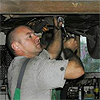News archive
Safeguarding garage workers |
| Posted on May 26 2009 |
| News archive >> OPINION |
 Last year, a student on work experience at a Lincolnshire garage was hospitalised following a fire in the garage. In March this year, the owner was ordered pay a total of £24,000 in fines and legal costs for breaching the Health and Safety at Work Act. The student was the victim of a fireball – formed when a colleague sprayed brake fluid onto a running engine – but also of his employer’s failure to comply with health and safety regulations.
Last year, a student on work experience at a Lincolnshire garage was hospitalised following a fire in the garage. In March this year, the owner was ordered pay a total of £24,000 in fines and legal costs for breaching the Health and Safety at Work Act. The student was the victim of a fireball – formed when a colleague sprayed brake fluid onto a running engine – but also of his employer’s failure to comply with health and safety regulations.
Unfortunately, such incidents are commonplace and many are much more dangerous. In August 2006, a garage worker sustained severe burns as a result of leaking petrol igniting at a garage in Nottingham. And in 2004, ASK provided technical evidence for a case in which an 18-year-old apprentice mechanic died after a petrol explosion at a Sussex garage. In the court proceedings that followed, his employer’s disregard for the health and safety of his staff became apparent. No health and safety training had been provided at the garage; the owner stated that safety was “common sense” and that the safety representative he had since employed was a waste of money.
Of course, these and other incidents could have been avoided if the employers had followed simple health and safety guidance provided by the Health and Safety Executive (HSE). But since there is no guarantee that employers will do so, garage workers, and especially those still learning the trade, are put at risk of fatal accidents. How else can employees be protected?
One revealing statistic is the staggering number of misfuelled cars that garage workers are confronted with. In the Sussex incident, the apprentice was fatally injured whilst disposing of fuel from a diesel vehicle that had been mistakenly filled with petrol. The same procedure is undertaken around 120,000 times every year in the UK.
The HSE strongly recommends that misfuelled cars are emptied using a fuel retriever – a container with an attached suction pump designed for safe draining of fuel tanks. Employees working in those garages that do not use fuel retrievers – such as the Sussex garage – are clearly at greater risk. But the sheer number of misfuelling operations means it is hard to imagine how all will be carried out without risk of fire, even if fuel retrievers are used – as in the Nottingham incident.
With so much at stake, would it not be safer to redesign fuel tank necks for petrol so as to be incompatible with the nozzles on diesel filling pumps? A few car manufacturers, including BMW, have already taken the initiative here and redesigned their fuel tanks. Regulations that would require all car manufacturers to follow suit could prevent thousands of costly fuel replacement operations every year, as well as avoiding unnecessary risks to untrained garage workers or staff whose health and safety lies in the hands of irresponsible employers.
Sign up for the ASK newsletter and receive more updates like these.
Last changed: Jun 15 2009 at 8:21 AM
Back